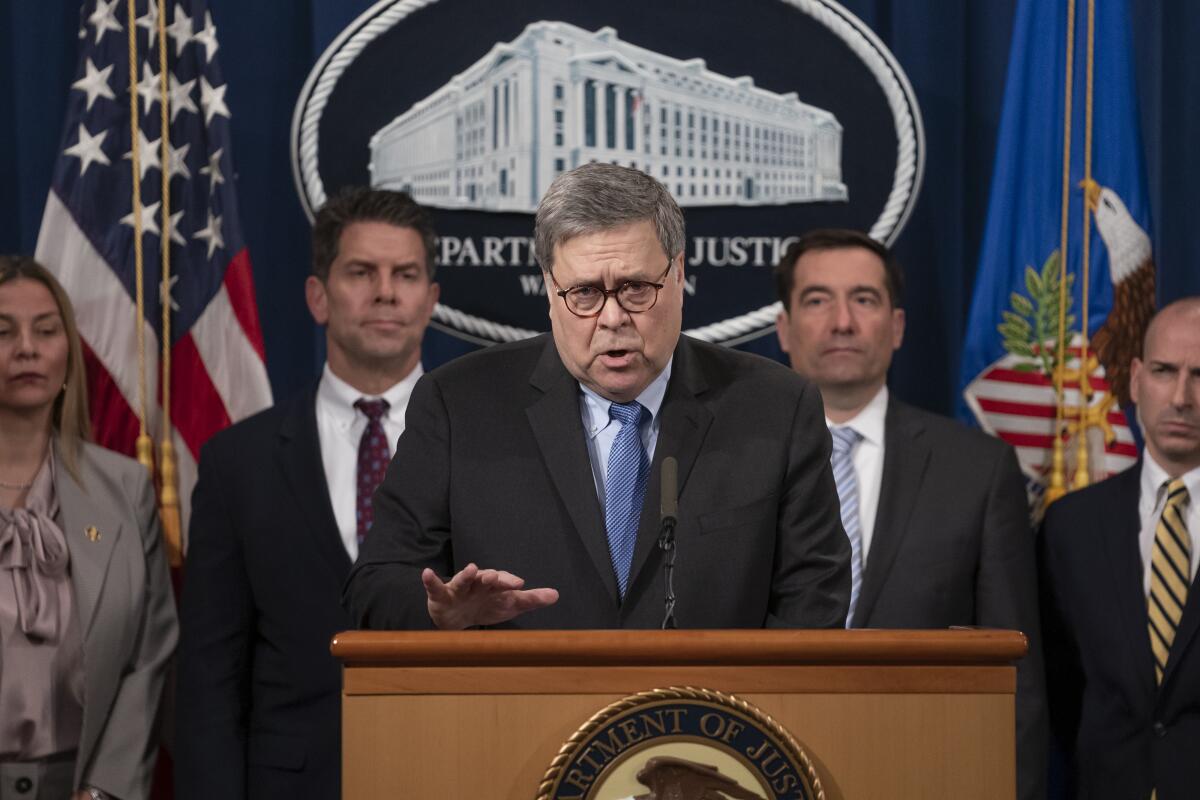Barr blasts Apple for not helping unlock Pensacola shooter’s iPhones

U.S. Atty. Gen. William Barr criticized Apple Inc. on Monday for not helping investigators unlock iPhones belonging to the alleged mastermind of a Dec. 6 terrorist attack at a Navy base in Florida.
The shooter had two iPhones, and the FBI quickly got court approval on probable cause to search the devices, Barr said in prepared remarks discussing the government’s investigation.
The attacker, a 21-year-old Saudi air force officer, opened fire at the base in Pensacola, killing three U.S. sailors and injuring eight other people. The attacker shot one of the phones, but the FBI was able to fix the device, Barr said. The second phone was also damaged but has been fixed. The shooter died during the incident at the Pensacola base, and the handsets were locked with passwords and encrypted, so the FBI can’t access information on the devices.
“It is very important to know with whom and about what the shooter was communicating before he died,” but the devices are “engineered to make it virtually impossible to unlock them without the password,” Barr said. “We have asked Apple for their help in unlocking the shooter’s iPhones. So far Apple has not given us any substantive assistance.”
The United States is removing nearly two dozen Saudi military students from a training program and sending them back to Saudi Arabia.
Tech companies and governments have clashed for years over balancing law enforcement access and user privacy. The latest encryption technology used on iPhones and other smartphones has increased this tension because the devices have become a lot harder for outside experts to hack into.
“This situation perfectly illustrates why it is critical that investigators be able to get access to digital evidence once they have obtained a court order based on probable cause,” Barr said Monday. “We call on Apple and other technology companies to help us find a solution so that we can better protect the lives of Americans and prevent future attacks.”
Apple addressed this last week in a statement. “We have the greatest respect for law enforcement and have always worked cooperatively to help in their investigations,” an Apple spokesman said at the time. “When the FBI requested information from us relating to this case a month ago, we gave them all of the data in our possession and we will continue to support them with the data we have available.”
Apple regularly responds to warrants by giving investigators access to data that is stored on its servers, such as users’ iCloud account information. However, the company has refused in the past to help authorities unlock iPhones to get on-device data. It has also argued that iPhone security and encryption mean the company can’t access such information even if it wanted to.
When Barr said Apple hasn’t provided substantive assistance, he was referring specifically to help accessing the data on the phones, Justice Department spokeswoman Kerri Kupec said. “They have yet to tell us whether they have the ability to get into the phones themselves,” she added.
A similar battle played out four years ago, when the Justice Department demanded that Apple help the FBI unlock an iPhone used by a gunman in the 2015 San Bernardino terror attack. Apple refused then too, and federal officials — with the help of an outside group — eventually found another way into the phone.
Apple has used privacy as a key differentiator between it and its competitors, consistently pushing the message that its hardware and services are more secure.
At the CES gadget show in Las Vegas last week, the company’s senior director of global privacy, Jane Horvath, described the ways Apple minimizes data collection or gathers information that is not tied to specific users. She cited digital assistant Siri pulling up weather data for a person’s city, not the person’s exact latitude and longitude.
Horvath also said Apple puts a privacy engineer and a lawyer on each team developing new devices.







